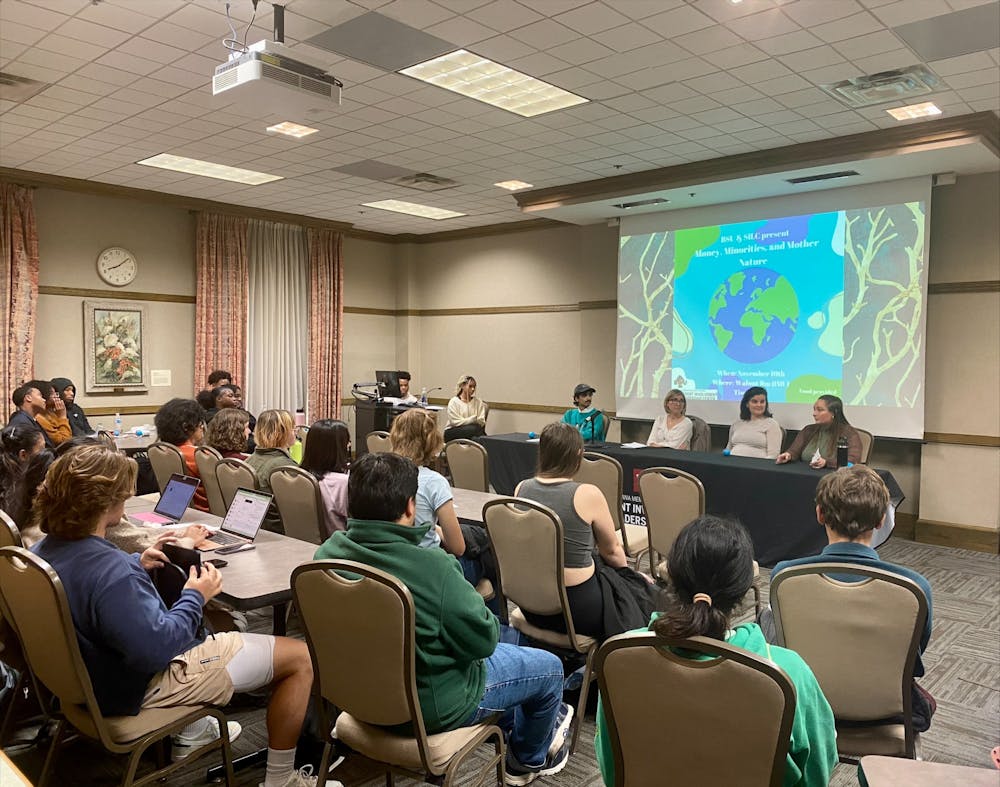The Black Student Union hosted the Money, Minorities and Mother Nature event in the Walnut Room in the Indiana Memorial Union on Nov. 10 to inform students about how environmental issues such as water pollution and waste management effects minority groups and those who live in low-income communities, causing environmental injustice.
The Student Involvement and Leadership Center co-sponsored the event. There were 30-40 people who attended the event which included the BSU executive board and freshman action team members, IU students and the panelist speakers.
The event began with a trivia game asking those who attended environmental questions such as which country has the highest recycling rate and which U.S. city has the most toxic waste sites. This was followed by a panel discussion.
Related: [IU is researching ways to make the university carbon neutral, curb greenhouse gas emissions]
The panelists included Lacey Lingelbach, IU graduate student in public affairs with a bachelor’s degree in environmental science, Rene Lloyd, employee at VET Environmental Engineering, Marta Venier, chemist and professor at the O’Neil School of Public and Environmental Affairs and Abhinav Kotaru, Students for a New Green World member and IU junior.
The questions asked pertained to how water pollution disproportionately impacts lower-income and minority communities, the importance of preserving clean air, who is affected by poor waste management and the effects of global warming and climate change on different groups of people.
The panelists spoke on how toxic waste sites are usually placed near lower-income communities where minority groups live because of redlining in U.S. cities.
According to a New York Times article, redlining is a discriminatory practice that was term that started in the 1930s and became more common during the 1960s. It withholds people in neighborhood labeled as “risky” for investment. These neighborhoods had minority groups and low-income residents residing there. According to a Washington Post article, redlining is now illegal, but people still suffer the effects from it.
“Everything is very interconnected, so air pollution affects water pollution, water pollution affects waste management,” Kotaru said when asked how global warming and climate change affect different groups of people. “So, places that are already in a bad situation are going to keep getting worse.”
Joa’quinn Griffin, SILC facilitator and IU junior, said it was important for SILC to help set in motion and be a part of this event to educate students on sustainability and how it affects minority groups, since SILC is the center that houses all the student organizations on campus.
“I value the environment and I’ve experienced firsthand what the impact of environmental injustice has caused to minority people,” Griffin said.
Environmental injustice is when people can be treated unfairly based on their race, skin color, ethnicity or income in regard to environmental policies and regulations, Natalia Dickerson, BSU Wellness Chair and IU sophomore, said. Environmental policies and regulations are less strict in low-income communities and countries because of lack of money and power, Dickerson said.
Related: [Sustainability Fair in Maxwell Hall to feature environmental groups, live music]
This affects the health of those people living in these communities because of unsafe drinking water and being in areas of toxic waste, she said.
“We need to start as a community coming together and trying to change policies and change industries and corporations in the way that they move,” Dickerson said. “We can try to evoke change that way so we can have a better environment.”
After Dickerson finished asking the panelist questions, students who attended the event were able to ask the panelists any questions they had.
IU sophomore Constance Cooper said it was important for her to attend the event to be informed of how environmental issues affect her as a person of color and to learn about how she can help with the environment.
Cooper said it can be simple things that she and others can do by taking initiative, such as rinsing off used aluminum foil and recycling it.
“Hearing the research and seeing the impact and seeing how passionate other people are about it, it makes it more of an issue that I should pay attention to and that’s why I came here today,” Cooper said.



